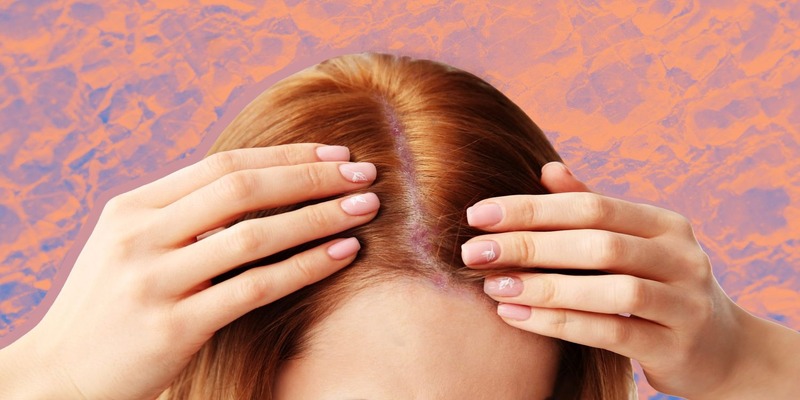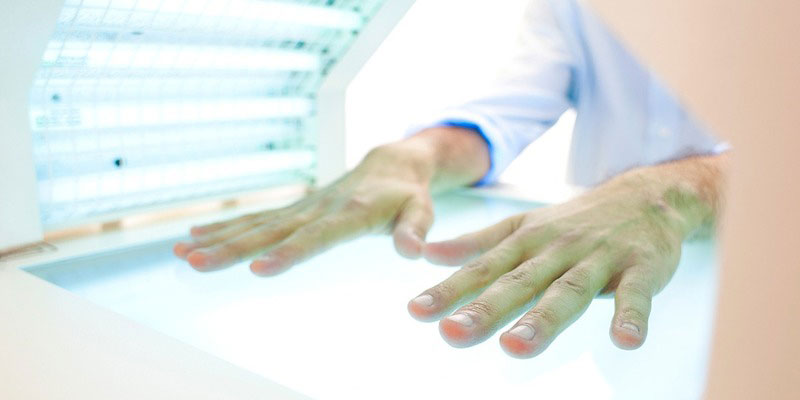According to the U.S. National Library of Medicine (NLM), psoriasis is a skin illness that creates itchy or irritated areas of thick, red skin with silvery scales; nevertheless, it is not contagious. On the other hand, Psoriasis is caused by problems with your immune system.
Cell turnover is a natural process in which new skin cells are produced and migrate to the skin's surface. According to the NLM, this process typically takes about a month. Still, in patients with psoriasis, it can be accelerated to a matter of days, resulting in the characteristic thick, scaly patches.
Head-To-Toe Psoriasis Symptoms

Scalp psoriasis, also known as plaque psoriasis, manifests as red or purple scaly areas on the scalp (known as plaques). The most prevalent kind of psoriasis is known as plaque psoriasis. Any organ or system in the body is fair game. Plaques from psoriasis of the scalp can travel to and affect other body parts.
- hairline
- forehead
- Neck and back
- earlobes
Reasons And Possible Contributors
The root cause of psoriasis is unknown at this time. They believe it happens when the immune system of a person is compromised; however, most persons with psoriasis report scalp issues.
According to two primary 2016 research, scalp psoriasis affects between 45 and 56 percent trusted Source of patients with psoriasis in the United States.
Psoriasis Patients Often Have Scalp Poriasis
Overall, more than eight million Americans have psoriasis, according to the National Psoriasis Foundation (NPF)—and approximately 80 percent of patients with psoriasis will also have scalp psoriasis.
Conversely, some people will experience scalp psoriasis, explains Jessica Kaffenberger, MD, a dermatologist and psoriasis expert at The Ohio State University Wexner Medical Center.
It can show as moderate to severe, according to the NPF. Scalp psoriasis can also expand across the forehead, the back of the neck, and around the ears.
Scalp Psoriasis Resembles Dandruff
Unlike dandruff, which only causes flaking and dryness, psoriasis of the scalp also causes a silvery appearance and clearly defined red, raised plaques. Psoriasis "scales can flake off much like dandruff.
Additionally, psoriasis itching is quite similar to dandruff irritation. However, he stresses that treatment for each illness must be approached separately.
Scalp Psoriasis Causes Hair Loss
According to the NPF, hair loss is prevalent among those who suffer from scalp psoriasis; however, this is more likely due to the damage done to the hair shaft and follicles by scratching, rubbing, and combing too vigorously, or by the substances in treatments, rather than psoriasis itself.
The good news is that psoriasis-related hair loss is usually only temporary and that, with the right therapy, healthy hair growth will resume once the psoriasis is under control.
There Are A Few Different Ways To Treat Scalp Psoriasis.
Depending on the severity of your scalp psoriasis, whether or not it has spread to other parts of your body, and how much it interferes with your daily life, your doctor may recommend a combination of topical therapies, phototherapy, and systemic medicine.
Doctors frequently recommend corticosteroids in foam, shampoo, cream, gel, or lotion to treat skin conditions. Philadelphia dermatologist Erum Ilyas, MD, claims this "generally gets your scalp psoriasis under control within two to four weeks."
Tips For Dealing with Scalp Psoriasis

Damage to the scalp, persistent inflammation, and hair loss can all be avoided with psoriasis treatment. Your condition's severity will determine the best course of therapy. Your doctor may mix or alternate between multiple treatment plans based on your specific situation. Here are some popular treatments for scalp psoriasis:
Calcipotriene
Various topical formulations of calcipotriene, including creams, foams, ointments, and solutions, are commercially available. It's rich in vitamin D, which has been shown to alter the growth of skin cells in psoriatic areas. In the US, you may find it under the brand names Dovonex (cream) and Sorilux.
Betamethasone-Calcipotriene
Redness and irritation caused by scalp psoriasis can be alleviated with a corticosteroid and vitamin D combination. It also alters how skin cells develop in afflicted locations.
There are a variety of formulations to choose from, including cream, foam, ointment, and suspension. Wynzora and Enstilar are the brand and generic names for this drug in the US. The name-brand Taclonex comes in both a topical ointment and a liquid solution.
Tazarotene
It assists with improving cell turnover, which helps minimize the number of plaques and keeps them under control. Brand names include Fabior, Average, and Arazlo can be found on store shelves. Tazorac, a popular brand name, comes in cream and gel forms.




